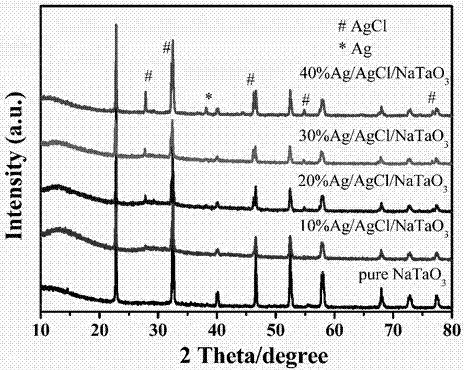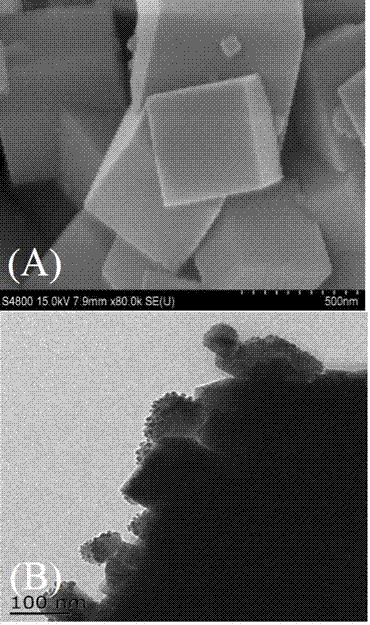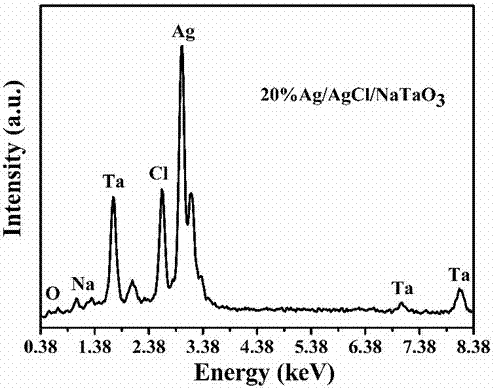A kind of preparation ag/agcl/natao 3 Method of Plasma Composite Photocatalyst
A plasma and catalyst technology, applied in the field of nanocomposite photocatalyst preparation, achieves the effects of complete crystallization, good dispersibility and regular morphology
- Summary
- Abstract
- Description
- Claims
- Application Information
AI Technical Summary
Problems solved by technology
Method used
Image
Examples
Embodiment 1
[0016] Example 1 Ag / AgCl / NaTaO 3 Preparation of Plasmonic Nanocomposite Photocatalysts
[0017] Add 400 mg of nano-sodium tantalate to 25 mL of silver nitrate solution containing 1.6, 3.2, 4.8, and 6.4 g / L respectively, stir magnetically, then add excess hydrochloric acid, continue stirring for 2 hours, and then place it under a 300 W xenon lamp After irradiating for 20 minutes, after the reaction, the obtained product was washed with deionized water, filtered, and dried in a constant temperature drying oven at 60°C.
Embodiment 2
[0018] Example 2 Ag / AgCl / NaTaO 3 Characterization and analysis of plasmonic nanocomposite photocatalysts
[0019] Such as figure 1 As shown, it can be seen from the figure that with the increase of the amount of Ag / AgCl, the peaks of AgCl and Ag gradually appeared, indicating that we successfully prepared Ag / AgCl / NaTaO 3 Plasmonic nanocomposite photocatalysts.
[0020] Such as figure 2 As shown, pure NaTaO can be seen in (A) 3 For nanoblocks, the presence of Ag and AgCl nanoparticles can be seen in (B).
[0021] Such as image 3 As shown, the spectrum shows the presence of silver, chlorine, tantalum, sodium, and oxygen elements.
[0022] Such as Figure 4 As shown, the presence of silver and elemental chlorine can be clearly seen in the figure.
Embodiment 3
[0023] Example 3 Ag / AgCl / NaTaO 3 Visible light catalytic activity experiments of plasmonic nanocomposite photocatalysts
[0024] (1) Prepare a rhodamine B solution with a concentration of 10 mg / L, and place the prepared solution in a dark place.
[0025] (2) Weigh 0.1 g of Ag / AgCl / NaTaO3 plasmonic nanocomposite photocatalyst, place them in the photocatalytic reactor respectively, add 100 mL of the target degradation solution prepared in step (1), stir magnetically for 30 min and wait for the photocatalyst to be composited. After the catalyst is evenly dispersed, turn on the water source and the light source to carry out the photocatalytic degradation experiment.
[0026] (3) Draw up the photocatalytic degradation solution in the reactor every 10 minutes, centrifuge and use it for the measurement of UV-Vis absorbance.
[0027] (4) by Figure 5 It can be seen that the prepared nanocomposite photocatalysts have excellent visible light catalytic activity, especially Ag / AgCl and...
PUM
 Login to View More
Login to View More Abstract
Description
Claims
Application Information
 Login to View More
Login to View More - R&D Engineer
- R&D Manager
- IP Professional
- Industry Leading Data Capabilities
- Powerful AI technology
- Patent DNA Extraction
Browse by: Latest US Patents, China's latest patents, Technical Efficacy Thesaurus, Application Domain, Technology Topic, Popular Technical Reports.
© 2024 PatSnap. All rights reserved.Legal|Privacy policy|Modern Slavery Act Transparency Statement|Sitemap|About US| Contact US: help@patsnap.com










